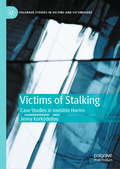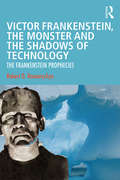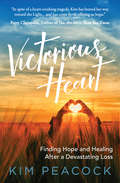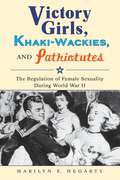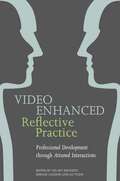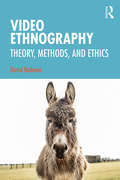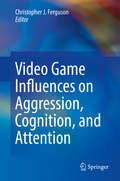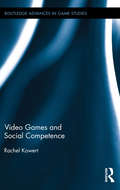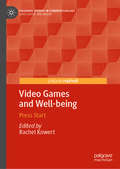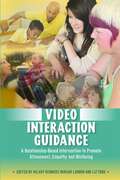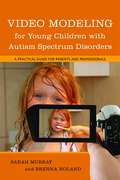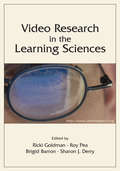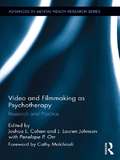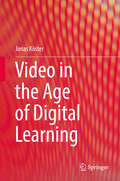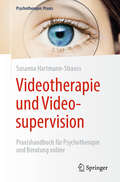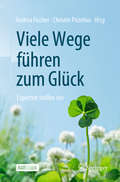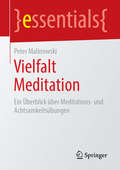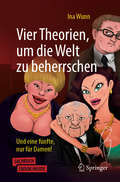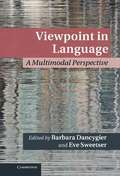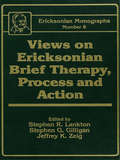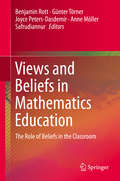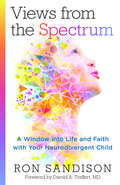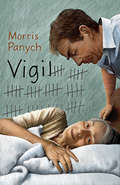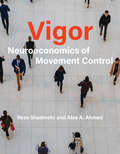- Table View
- List View
Victims of Stalking: Case Studies in Invisible Harms (Palgrave Studies in Victims and Victimology)
by Jenny KorkodeilouThis book explores the nature and impact of stalking and criminal justice system responses to this type of abuse based on the experiences and lived realities of victims. Drawing on in-depth interviews with 26 self-defined victims of stalking in England and Wales, it explores the psychological and social effects of this hidden and misunderstood form of interpersonal violence. Korkodeilou's work seeks to improve understanding regarding this type of abuse, contribute to feminist criminology and gender-based violence literature, and expand scholarly knowledge with her research's theoretical, methodological and practical implications. Victims of Stalking will appeal to academics in the fields of victimology, victimisation, gender-based and interpersonal violence, criminal justice system responses to victims and to criminal justice system professionals (e.g. police officers, probation officers, and lawyers).
Victor Frankenstein, the Monster and the Shadows of Technology: The Frankenstein Prophecies
by Robert D. RomanyshynIn Victor Frankenstein, the Monster and the Shadows of Technology: The Frankenstein Prophecies, Romanyshyn asks eight questions that uncover how Mary Shelley’s classic work Frankenstein haunts our world. Providing a uniquely interdisciplinary assessment, Romanyshyn combines Jungian theory, literary criticism and mythology to explore answers to the query at the heart of this book: who is the monster? In the first six questions, Romanyshyn explores how Victor’s story and the Monster’s tale linger today as the dark side of Frankenstein’s quest to create a new species that would bless him as its creator. Victor and the Monster are present in the guises of climate crises, the genocides of our "god wars," the swelling worldwide population of refugees, the loss of place in digital space, the Western obsession with eternal youth and the eclipse of the biological body in genetic and computer technologies that are redefining what it means to be human. In the book’s final two questions, Romanyshyn uncovers some seeds of hope in Mary Shelley’s work and explores how the Monster’s tale reframes her story as a love story. This important book will be essential reading for academics and students of Jungian and post-Jungian theory, literature, philosophy and psychology, psychotherapists in practice and in training, and for all who are concerned with the political, social and cultural crises we face today.
Victorious Heart: Finding Hope and Healing After a Devastating Loss
by Kim PeacockA mother shares how God&’s grace helped her through the loss of her child in this memoir of faith, healing, and hope in the midst of tragedy. Losing a loved one can leave you feeling broken, but grief is not something that can be fixed or cured. It is the experience of missing a part of yourself. In Victorious Heart, Kim Peacock openly recounts the devastating loss of her oldest daughter, Nicole, and reveals how the Lord carried her through―and is still carrying her through―the deepest sorrow of her life. For others who are experiencing terrible grief, Victorious Heart offers consolation and wisdom. Kim shares how she managed some of the difficult &“firsts&” like birthdays and holidays, and how she learned to avoid the &“Blame Game.&” Grieving family members learn that it will be okay to laugh again and that they too can have a Victorious Heart.
Victory Girls, Khaki-Wackies, and Patriotutes: The Regulation of Female Sexuality during World War II
by Marilyn E HegartyA study of how the U.S. government&’s World War II fight against venereal disease transformed into a war against women.Victory Girls, Khaki-Wackies, and Patriotutes offers a counter-narrative to the story of Rosie the Riveter, the icon of female patriotism during World War II. With her fist defiantly raised and her shirtsleeves rolled up, Rosie was an asexual warrior on the homefront. But thousands of women supported the war effort not by working in heavy war industries, but by providing morale-boosting services to soldiers, ranging from dances at officers&’ clubs to more blatant forms of sexual services, such as prostitution. While the de-sexualized Rosie was celebrated, women who used their sexuality—either intentionally or inadvertently—to serve their country encountered a contradictory morals campaign launched by government and social agencies, which shunned female sexuality while valorizing masculine sexuality. This double-standard was accurately summed up by a government official who dubbed these women &“patriotutes&”: part patriot, part prostitute. Marilyn E. Hegarty explores the dual discourse on female sexual mobilization that emerged during the war, in which agencies of the state both required and feared women&’s support for, and participation in, wartime services. The equation of female desire with deviance simultaneously over-sexualized and desexualized many women, who nonetheless made choices that not only challenged gender ideology but defended their right to remain in public spaces.
Vida emocionalmente inteligente: Estrategias para incrementar el coeficiente emocional
by Juan Castilla Plaza Geetu BharwaneyUn libro obligatorio para quien desee tener un mayor conocimiento sobre inteligencia emocional.Reuven Bar-On, editor del libro The Handbook of Emotional Intelligence (Manual de inteligencia emocional).Vida emocionalmente inteligente no es un libro para leer, sino para hacer, ya que pone en práctica la teoría de la inteligencia emocional. Si el concepto de inteligencia emocional te es desconocido, no te preocupes, ya que empieza con un breve resumen de lo que es la inteligencia emocional, y lo explica utilizando términos que no requieren conocimientos previos de psicología. Además, nos da la gran noticia de que la inteligencia emocional puede aprenderse y que el coeficiente emocional también puede desarrollarse.Vida emocionalmente inteligente contiene un programa único de mejora que aumentará tu habilidad para utilizar las emociones de forma eficiente. Está repleto de estrategias para controlar las emociones, además de unas ideas muy inspiradoras para enfocar tus sentimientos. Te ofrece el mejor método para vivir una vida emocionalmente inteligente.Geetu Bharwaney es la fundadora y directora de EI World Limited, una empresa a la vanguardia de las innovaciones relacionadas con la inteligencia emocional y los programas de desarrollo en Europa. Geetu es conocida por ser una de las pioneras en el campo de la inteligencia emocional.
Video Enhanced Reflective Practice: Professional Development through Attuned Interactions
by Karen Williams Martin Elliott Nancy Ferguson Hilary Kennedy Miriam Landor Liz Todd Emily Archer Jane Nestel-Patt Emma Cartwright Cyril Hellier Michelle Sancho Wilma Barrow Joanna Begley Stephanie Satariano Lucy Browne Ben Hayes Jo Birbeck Anna-Greta Ledin Kaisa Martikainen Lia Van Rosmalen Susan Lyon Bev Jowett Katja Burakoff Helen Upton Robin Sen Carole Chasle Jo Hewitt Annemie Wetzels Fiona Williams Angela Underdown Kirsty Quinn Helen Gibson Sandra Strathie Monika Celebi Ruben Fukkink Jenny Jarvis Sheridan Forster Terri Pease Maria V. Doria Alex Greene Clare WebsterVideo Enhanced Reflective Practice (VERP), an application of Video Interaction Guidance, supports individuals or groups to reflect on and develop their professional communication, teaching or therapeutic skills with their clients through shared review of moments of attuned interaction in video clips of their day-to-day practice. This book brings together international researchers and practitioners from a range of professions to define VERP, present its theoretical basis and review the current research evidence. Increasing in popularity, VERP is used as a reflective professional development tool for a wide range of professionals and employees, supporting them to analyse and reflect on moments of their effective interaction on video, in situ in the professional environment. The VERP approach is optimistic and empowering, focusing on strength and potential rather than problems or weaknesses. This book provides examples of VERP's application in a wide range of sectors and will be of interest to trainers, CPD providers, managers, psychologists, social workers, higher education educators, health visitors, early years professionals, teachers, counsellors, therapists, and professionals in the private, voluntary, government and local authority sectors.
Video Ethnography
by David RedmonVideo Ethnography provides a thought-provoking, guided framework to ethnographic filmmaking. It examines how this kind of filmmaking can be a means of approximating, mediating and evoking lived experience. Functioning as a kind of sensory extension of the videographer, video ethnography arises directly out of lived experience as a process of dynamic encounters, mobile situations, and embodied approaches that include senses and choices of the videographer, and the participants of the ethnography. The book will help describe and develop students‘ sensibility and awareness of this crucial aspect of video ethnography, so they can craft their own video ethnographies with a fully conscious awareness of how certain skilled and attuned approaches to audiovisual techniques can help facilitate the fullest and most dynamic encounters possible. This book is suitable for classes in ethnographic filmmaking, video ethnography and visual anthropology / sociology.
Video Game Influences on Aggression, Cognition, and Attention
by Christopher J. FergusonThis book addresses the ongoing scientific debates regarding video games and their effects on players. The book features opposing perspectives and offers point and counterpoint exchanges in which researchers on both sides of a specific topic make their best case for their findings and analysis. Chapters cover both positive and negative effects of video games on players’ behavior and cognition, from contributing to violence and alienation to promoting therapeutic outcomes for types of cognitive dysfunction. The contrasting viewpoints model presents respectful scientific debate, encourages open dialogue, and allows readers to come to informed conclusions. Key questions addressed include: · Do violent video games promote violence? · Does video game addiction exist? · Should parents limit children’s use of interactive media? · Do action video games promote visual attention? · Does sexist content in video games promote misogyny in real life? · Can video games slow the progress of dementia? · Are video games socially isolating?Video Game Influences on Aggression, Cognition, and Attention is a must-have resource for researchers, clinicians and professionals as well as graduate students in developmental psychology, social work, educational policy and politics, criminology/criminal justice, child and school psychology, sociology, media law, and other related disciplines.
Video Games and Social Competence (Routledge Advances in Game Studies)
by Rachel KowertDespite their popularity, online video games have been met with suspicion by the popular media and academic community. In particular, there is a growing concern that online video game play may be associated with deficits in social functioning. Due to a lack of empirical consistency, the debate surrounding the potential impact of online video game play on a user’s sociability remains an active one. This book contributes to this debate by exploring the potential impact of online video game involvement on social competence outcomes, theoretically and empirically. Through empirical research, Kowert examines the relationships between online video game involvement, social goals, and social skills and discusses the underlying mechanisms of these effects.
Video Games and Well-being: Press Start (Palgrave Studies in Cyberpsychology)
by Rachel KowertThis book examines how video game mechanics and narratives can teach players skills associated with increased psychological well-being. It integrates research from psychology, education, ludology, media studies, and communication science to demonstrate how game play can teach skills that have long been associated with increased happiness and prolonged life satisfaction, including flexible thinking, openness to experience, self-care, a growth mindset, solution-focused thinking, mindfulness, persistence, self-discovery and resilience. The chapters in this volume are written by leading voices in the field of game studies, including researchers from academia, the video gaming industry, and mental health practitioners paving the way in the field of “geek therapy.” This book will advance our understanding of the potential of video games to increase our psychological well-being by helping to mitigate depression, anxiety, and stress and foster persistence, self-care, and resilience.
Video Modeling for Young Children with Autism Spectrum Disorders: A Practical Guide for Parents and Professionals
by Sarah Murray Brenna NolandVideo modeling takes visual learning to the next level by using new technologies to create an effective teaching tool. This book explains how professionals and parents can use innovative video modeling techniques to support the development of young children with autism spectrum disorders in school, home or community settings. Offering practical step-by-step guidance, the book shows how to film and edit personalized videos that highlight the exact skill that is being taught. Whether the focus is increasing attention, peer interaction, getting dressed or creative play, these videos are easy to incorporate into daily routines. They allow the child to learn new skills quickly and with less hands-on adult support leading to greater independence. Three video modeling strategies are presented - Basic Video Modeling, Video Self-Modeling and Point-of-view Video Modeling - along with all the information needed for readers to start using the techniques for themselves. The research behind the approach is also discussed and each chapter includes detailed case studies that demonstrate the techniques in action.
Video Research in the Learning Sciences
by Brigid Barron Roy Pea Ricki Goldman Sharon J. DennyVideo Research in the Learning Sciences is a comprehensive exploration of key theoretical, methodological, and technological advances concerning uses of digital video-as-data in the learning sciences as a way of knowing about learning, teaching, and educational processes. The aim of the contributors, a community of scholars using video in their own work, is to help usher in video scholarship and supportive technologies, and to mentor video scholars, so that video research will meet its maximum potential to contribute to the growing knowledge base about teaching and learning. This volume contributes deeply to both to the science of learning through in-depth video studies of human interaction in learning environments—whether classrooms or other contexts—and to the uses of video for creating descriptive, explanatory, or expository accounts of learning and teaching. It is designed around four themes—each with a cornerstone chapter that introduces and synthesizes the cluster of chapters related to it: Theoretical frameworks for video research; Video research on peer, family, and informal learning; Video research on classroom and teacher learning; and Video collaboratories and technological futures. Video Research in the Learning Sciences is intended for researchers, university faculty, teacher educators, and graduate students in education, and for anyone interested in how knowledge is expanded using video-based technologies for inquiries about learning and teaching. Visit the Web site affiliated with this book: www.videoresearch.org
Video and Filmmaking as Psychotherapy: Research and Practice (Advances in Mental Health Research #4)
by J. Lauren Johnson Joshua L. Cohen Penny OrrWhile film and video has long been used within psychological practice, researchers and practitioners have only just begun to explore the benefits of film and video production as therapy. This volume describes a burgeoning area of psychotherapy which employs the art of filmmaking and digital storytelling as a means of healing victims of trauma and abuse. It explores the ethical considerations behind this process, as well as its cultural and developmental implications within clinical psychology. Grounded in clinical theory and methodology, this multidisciplinary volume draws on perspectives from anthropology, psychiatry, psychology, and art therapy which support the use and integration of film/video-based therapy in practice.
Video in the Age of Digital Learning
by Jonas KösterAlthough video is now ubiquitous in education, its full potential is oftentimes not fully understood, nor is it used to utmost potential. This timely volume seeks to address this gap by providing educators and instructional designers with a comprehensive and in-depth understanding of video production processes and methods for designing effective instructional videos. From its discussion of the significance of digital learning and impact of instructional video to its unique focus on the best design and production techniques that make video an effective teaching tool, this book offers applicable and tested strategies for creating quality instructional video. The accompanying website, which allows readers to see sample videos and access additional online resources, underscores the book’s practitioner focus. Among the topics covered: · Instructional videos for teaching and learning · Design and interactivity of instructional videos · Production, distribution, and integration of instructional videos · The future of instructional video Video in the Age of Digital Learning is an important, practical contribution to the scholarship exploring methods for sharing and acquiring knowledge in the digital age. It promises to be a valuable resource for educators, instructional designers, instructional media producers, and educational technology professionals.
Videotherapie und Videosupervision: Praxishandbuch für Psychotherapie und Beratung online (Psychotherapie: Praxis)
by Susanna Hartmann-StraussDieses Manual für Psychotherapeuten und Supervisoren zeigt, wie Sprechstunde und Supervision per Video gelingen – einem Medium, dem in der Beratungsbeziehung oft das Etikett der zweiten Wahl anhaftet. Richtig genutzt bietet die Videotherapie jedoch Möglichkeiten, die über die Face-to-Face-Interaktion hinausgehen. Exposition, Rollenspiel und Entspannung – das alles funktioniert online. Die Videobehandlung erleichtert die Umsetzung von Interventionen, stärkt die professionelle Interaktion und fördert so therapeutische Effekte. Hierfür muss eine hohe Vertrautheit mit dem Medium und der Kommunikation innerhalb des Mediums vorhanden sein sowie eine Sensibilität für die Grenzen des Einsatzes. Neben rechtlichen und technischen Grundlagen vermittelt das Praxishandbuch daher Gesprächsstrategien und Adaptionen der wesentlichen therapeutischen und supervisorischen Vorgehensweisen. Aus dem Inhalt: Technische und rechtliche Grundlagen – Vorbehalte – Sitzungsorganisation – Struktur und Ablauf – Interventionen – Dos and Don'ts. Geschrieben für Psychotherapeuten und Supervisoren und zudem alle Berater, die Video nutzen, um mit ihren Klienten zu kommunizieren. Über die Autorin: Susanna Hartmann-Strauss ist Diplompsychologin, Psychologische Psychotherapeutin und Supervisorin. Sie arbeitet kassenzugelassen in eigener Praxis, ist seit mehr als 15 Jahren in der Weiterbildung tätig und begeisterte Onlinetherapeutin.
Viele Wege führen zum Glück: Experten stellen vor
by Andrea Fischer Christin PrizeliusVerschiedene Wege führen zum Glück – finden Sie Ihren!Dieses Buch richtet sich an alle Menschen, die sich mit dem Thema Glück für sich und andere beschäftigen, und zeigt, dass das Glück oft näher und greifbarer ist als gedacht. Für jeden bedeutet Glück etwas anderes und jeder Mensch darf dabei selbst herausfinden, was ihn glücklich macht. Wissenschaftlich fundiert und praxisnah bieten die Autoren vielseitige Inspirationen zum Thema. Sowohl aktuelle Forschungsfelder als auch individuelle Projekte werden verständlich und konkret dargestellt. Dabei wird der Leser eingeladen zu reflektieren und eigene Impulse zu setzen. Ziel ist mehr Lebensfreude, eine ganzheitliche positive Ausrichtung und Einstellung, sowohl für den Einzelnen als auch die Gesellschaft und damit eine bessere Gesundheit und mehr Wohlbefinden. Entdecken Sie Ihren Weg zum Glück und gestalten Sie ihn selbst aktiv mit!
Vielfalt Meditation: Ein Überblick Über Meditations- Und Achtsamkeitsübungen (Essentials)
by Peter MalinowskiDieses essential bietet einen Überblick über Meditationsrichtungen, -programme und -techniken und führt die wichtigsten Begriffe und Definitionen ein. Peter Malinowski entwirrt die Vielfalt unterschiedlicher Meditationsangebote und vermittelt ein grundlegendes Verständnis von Meditation und Achtsamkeit. Der Leser bekommt einen Leitfaden zur Einteilung von Meditationsübungen, verbunden mit dem Handwerkszeug, um unterschiedliche Angebote sinnvoll unterscheiden zu können. Zudem werden die wichtigsten Erklärungsansätze zur Wirkung von Meditation eingeführt.
Vier Theorien, um die Welt zu beherrschen: Und eine fünfte, nur für Damen!
by Ina WunnWie kommt man gesellschaftlich ganz nach oben? Man kämpft um Macht und Anerkennung und möchte um jeden Preis Aufmerksamkeit erregen. Dabei stellt sich die Frage: Ist das wirklich so einfach und wenn ja, wo fange ich an?Gibt es einen Dresscode, der mich als Mitglied der herrschenden Klasse auszeichnet? Hilft es gar, wenn Frauen Miniröcke und tiefe Ausschnitte tragen? Läuft es etwa darauf hinaus, dass sich meine egoistische Überlebensmaschine mit ebenso egoistischen und möglichst erfolgreichen Genen zusammentut? Geht es in letzter Konsequenz nur um Paarung, um die Alphastellung und damit um einen bevorzugten Platz auf der Mating-Liste?Über all das haben sich Generationen von Biologen, Verhaltensforschern und zuletzt auch Gesellschaftswissenschaftlern Gedanken gemacht. Aber erst, wenn man vier bahnbrechende und eigentlich ganz simple Theorien (egoistisches Gen, Ritual, System und Habitus) in einen inhaltlichen Zusammenhang bringt, lässt sich das Rätsel um das große Spiel von Liebe und Macht, von Schönheit und Herrschaft, von Aufstieg und Fall durchschauen. Und sollten wir die mit Beispielen aus der Welt der Reichen und Schönen angereicherte Lektüre als Lehrstück auffassen, steht unserem gesellschaftlichen Aufstieg in die herrschende Klasse nichts mehr im Wege!
Viewpoint in Language
by Barbara Dancygier Eve SweetserWhat makes us talk about viewpoint and perspective in linguistic analyses and in literary texts, as well as in landscape art? Is this shared vocabulary marking real connections between the disparate phenomena? This volume argues that human cognition is not only rooted in the human body, but also inherently 'viewpointed' as a result; consequently, so are language and communication. Dancygier and Sweetser bring together researchers who do not typically meet on common ground: analysts of narrative and literary style, linguists examining the uses of grammatical forms in signed and spoken languages, and analysts of gesture accompanying speech. Using models developed within cognitive linguistics, the book uncovers surprising functional similarities across various communicative forms, arguing for specific cognitive underpinnings of such correlations. What emerges is a new understanding of the role and structure of viewpoint and a groundbreaking methodology for investigating communicative choices across various modalities and discourse contexts.
Views On Ericksonian Brief Therapy (Ericksonian Monograph Ser. #No.8)
by Jeffrey K. Zeig Stephen R. Lankton Stephen G. GilliganEight papers from the Fourth International Congress on Ericksonian Approaches to Hypnosis and Psychotherapy, held December 1988, San Francisco, California. No index. Annotation copyright Book News, Inc. Portland, Or.
Views and Beliefs in Mathematics Education: The Role Of Beliefs In The Classroom
by Günter Törner Benjamin Rott Joyce Peters-Dasdemir Anne Möller SafrudiannurThe book is made up of 21 chapters from 25 presentations at the 23rd MAVI conference in Essen, which featured Alan Schoenfeld as keynote speaker. Of major interest to MAVI participants is the relationship between teachers’ professed beliefs and classroom practice. The first section is dedicated to classroom practices and beliefs regarding those practices, taking a look at prospective or practicing teachers’ views of different practices such as decision-making, the roles of explanations, problem-solving, patterning, and the use of play. The focus of the second section in this book deals with teacher change, which is notoriously difficult, even when the teachers themselves are interested in changing their practice. The third section of this book centers on the undercurrents of teaching and learning mathematics, what rises in various situations, causing tensions and inconsistencies. The last section of this book takes a look at emerging themes in affect-related research. In this section, papers discuss attitudes towards assessment.
Views from the Spectrum: A Window into Life and Faith with Your Neurodivergent Child
by Ron SandisonA remarkable inside look at the intersection of faith and autism for parents longing to connect their children with God's loveRaising a child with autism is both a challenge and an adventure--and sometimes parents need to know there can also be wonderful potential for blessings. Views from the Spectrum shares the inspiring stories of twenty amazing young adults with autism and how each of their family's unwavering support and faith in God led them to accomplish what was thought impossible. As a thriving adult with autism himself, Ron Sandison is determined to educate the world on the gifts and talents autism can cultivate--even when they differ from our expectations of typical success.While it is primarily a much-needed how-to guide for parents of children with special needs, this book is also a stunning view into the world of autism. Readers will witness the courage of Tyler Gianchetta, who rescued his mother from a burning vehicle. They'll marvel at the artistic talent of nonverbal poet and artist Kimberly Dixon, admire the determination of Armani Williams, competing as a NASCAR driver, and find encouragement in the many other stories within these pages. In addition to these experiences, Sandison has also interviewed top experts in the autism field and shares their insights here.Sandison weaves narrative with Scripture, sharing his own journey with autism throughout the book. Full of anecdotes, scientific research, parenting tips, prayers, devotions, and more, Views from the Spectrum is a celebration of autism, faith, and the possibilities at their intersection.
Vigil
by Morris PanychA man returns after thirty years to sit with a relative on her deathbed. Kemp's problem is: she's not dying fast enough. Through Kemp's own errors and inattentiveness, the visit that he thinks will take a day or two stretches into a year. A play of mistaken identity, twisted circumstance, and surprising turns, this is one Vigil worth keeping.
Vigor: Neuroeconomics of Movement Control
by Reza Shadmehr Alaa A. AhmedAn examination of the link between the vigor with which we move and the value that the brain assigns to the goal of the movement.Why do we reflexively run toward people we love, but only walk toward others? In Vigor, Reza Shadmehr and Alaa Ahmed examine the link between how the brain assigns value to things and how it controls our movements. They find that brain regions thought to be principally involved in decision making also affect movement vigor--and that brain regions thought to be principally responsible for movement also bias patterns of decision making.
